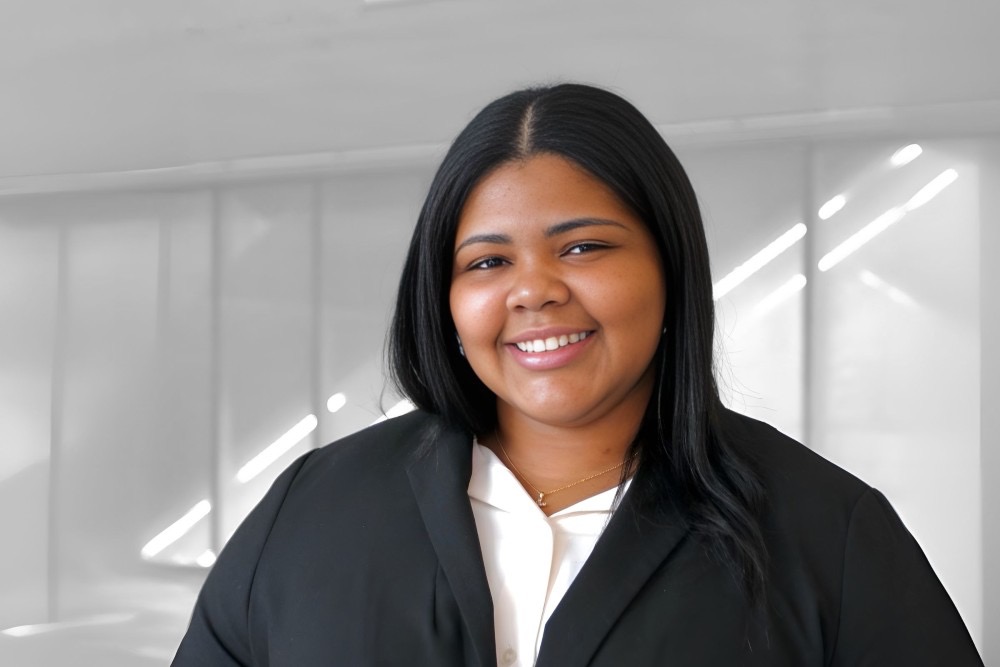
Forensic Psych Internship Propels Imani Thomas ’25 to PhD
Major: B.A. in Forensic Psychology
Minor: Africana Studies
Mentors: Elizabeth Jeglic, Ph.D., Ernest Lee, Ph.D., Bettina Muenster
Programs: Honors Program, McNair Post-Baccalaureate Achievement Program, Office for Student Research & Creativity (OSRC)
Internships: University of Wisconsin-Madison/National Science Foundation (NSF)
Hometown: Long Island, New York
Career Aspiration: Psychologist
What was life like before John Jay?
No one in my family had ever gone to college, but once my parents found out that earning a degree was my goal, they supported me wholeheartedly. My mom is a front-end manager at Target and my dad is a chef. They both picked up extra shifts so I could have money for college applications, books, or anything else I needed. They were all in when it came to supporting my dreams.
Why John Jay?
Ultimately, it was the forensic psychology major that drew me to the College. The more I looked into the courses, the more I could see that it truly intersected both the forensic and psychology realms. It tackled the legal and justice aspects of the field and focused on making students strong advocates. I was also excited to go to a Minority-Serving Institution (MSI). Growing up in Riverhead, New York, there were not a lot of African Americans and my school was not very diverse. So, attending an MSI was a big deal for me. Seeing that the chair of the psychology department was a Black professor really surprised me. The professors in the department came from many different ethnic backgrounds and the research they were doing was so diverse. All of this made me sure that John Jay was the perfect college for me.
How have your mentors helped put you on the path to success?
Dr. Jeglic (psychology professor) has been instrumental in everything I’ve done. As an undergraduate, you don’t normally get hands-on research experience in the realm of sex violence, but because of Dr. Jeglic I did. In every meeting, she was incredibly supportive, open, and excited for me to engage in research. During our first meeting, she immediately said, “Okay, I’ll be your mentor, and I want you to join in on this new project I’m doing.” She introduced me to OSRC and pushed me to get involved with different research opportunities. There is no better mentor out there than Dr. Jeglic. I get emotional just thinking about how much she cares about her students.
At first, I was intimidated by Dr. Lee (McNair associate director), but after I got into McNair, I found out how funny, wise, and dedicated he is. He was someone who always had resources for internships and conferences. Dr. Lee made McNair feel like a family, and over time, he became a father figure for me. He was very adamant about us getting more research experience, and I’m happy that I took his advice to heart.
I wasn’t always sure about my public speaking skills, but because of Bettina Muenster (OSRC assistant director), I gained so much experience as a presenter. When she found out I was interested in sexual violence research, she came up with experiential learning trips that we could go on in the fall—like going to precincts or visiting Safe Horizons. Ms. Muenster is someone who will hold your hand through the first steps, but then make sure you know you can do the next steps on your own.
How did your mentors help you secure the internship at the University of Wisconsin-Madison?
I found out about the internship through Dr. Lee. The project was called PIVOT, preventing interpersonal violence, and overcoming trauma. It covered so many topics I was interested in studying—sexual assault, marginalized communities, self-blame, disclosure, and substance use—and the fact that it was an NSF-funded project made it even more appealing. When I told Dr. Jeglic I was applying, she couldn’t have been more supportive. She even sent me interview notes to prepare for my initial meeting with the team at the University of Wisconsin-Madison. I got an acceptance offer 13 hours after my interview, and I knew it was because of my mentor’s guidance.
What did you do during the internship?
Going to the Midwest from New York was a big change for me, but from the moment I got to Wisconsin, I was immersed in the research. I was immediately learning programs like Python, DB Browser, SQL, and OpenRefine. We got to engage in awesome workshops, attended faculty talks, went on lab tours, and participated in research meetings. I was in my lab almost every day learning how to code. I also immersed myself in the Wisconsin lifestyle—going to farmers’ markets, visiting the zoo, trying canoeing, and even putting on a cheese hat. The internship deepened my analytical and critical thinking skills, enhanced my network of psychology professionals, and changed my life. It was a phenomenal program that made me a better researcher.
Where do you see yourself in 10 years?
This fall I’ll be applying to clinical psychology Ph.D. programs. After earning my doctorate, I see myself in the realms of both research and clinical work. I want to have my own practice that focuses on survivors of sexual assault. I would also like to have a sector of my work focused on policy. We need more legislation that assists people who have experienced sexual assault. I want to help advocate for the passage of legislation that gets these survivors the care they need.



